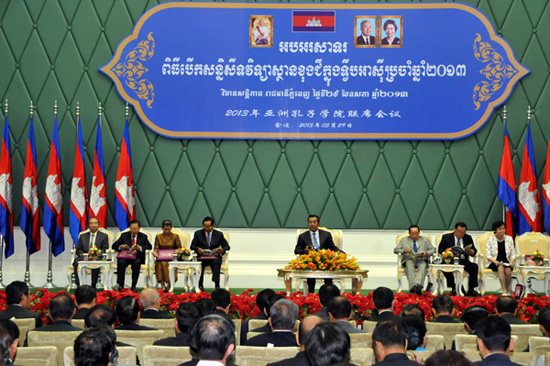- Notice
- Homepage > Notice
- 2016-03-07 10:39:11
-


Phnom Penh, May 29th (Xinhua) (Reporter Xu Jiangshan, Li Hong) - The 2013 Joint Conference of Confucius Institutes in Asia was held on the afternoon of May 29th in Phnom Penh, the capital city of Cambodia. Cambodian Prime Minister Hun Sen and Director-General of Hanban Xu Lin attended the opening ceremony of the conference and delivered speeches.
In his speech, Hun Sen said that China is an important economic entity that promotes the world’s economic development and that the international standing of Chinese language is continuously improving. With a good command of Chinese language, one can make friends from all over the world and improve their own potential for future development as well. He encouraged Cambodian teenagers to work hard in learning the Chinese language so as to promote their competitiveness in both future career development and self-development. He said he hoped that the Confucius Institute Headquarters could further popularize and promote Chinese culture, launch Chinese culture activities around the world, and allow the world’s people to learn about and understand the extensiveness and profoundness of Chinese culture.
Xu Lin said that the Confucius Institute Headquarters has founded a number of Confucius Institutes and Confucius Classrooms in 113 countries, among which there are 90 Confucius Institutes and 49 Confucius Classrooms in Asia. She said that the Confucius Institutes would focus on the localization of teaching materials and faculty competitiveness, continue to make steady progress, and further become an important platform for various countries and regions to develop language and cultural exchanges with China.
Hosted by the Confucius Institute at Royal Academy of Cambodia, the joint conference will last 3 days and it is themed by “sustainable development of Confucius Institutes in Asia”. At the conference, four topics, including the localized construction of teaching staff, development of teaching materials with local characteristics, preparation for the 10th anniversary of the Confucius Institute next year, and the implementation of the “Core Teacher” program, will be discussed in detail.
- [Return Home] [Print] [Back]

